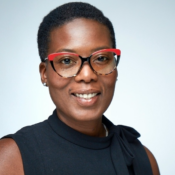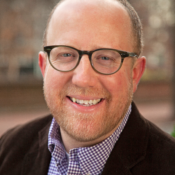Wharton Neuroscience Summit
The Adaptive Brain: Strategic Resilience for Business Leaders

Dolores Albarracin, PhD, Amy Gutmann Penn Integrates Knowledge University Professor; Director, Social Action Lab, University of Pennsylvania
Dolores Albarracín is a social psychologist who studies social cognition, communication, and behavioral change. She is a Penn Integrates Knowledge Professor at the University of Pennsylvania and a fellow of the American Academy of Arts and Sciences, the American Academy of Political and Social Science, and the Association for the Advancement of Sciences. She is also a fellow of the Society for Social and Personality Psychology, the American Psychological Association (Divisions 8, 9, and 38), the Association for Psychological Science, and the Society for Experimental Social Psychology. Her research (~ 200 publications) has been recognized with an award for Outstanding Mid-Career Contributions to the Psychology of Attitudes and Social Influence from the Society of Social and Personality Psychology in 2018 and the Diener Award to Outstanding Mid-Career Contributions to Social Psychology from the same society in 2020. She has published six books, including three volumes of the Handbook of Attitudes and two authored monographs: Action and Inaction in a Social World: Predicting and Changing Attitudes and Behaviors (2021) and Creating Conspiracy Beliefs: How Our Thoughts are Shaped (D. Albarracin, J. Albarracin, M-P.S. Chan, & K.H. Jamieson, 2022), both published by Cambridge University Press. She received the 2019 Avant-Garde Award from the National Institutes of Health and $43 million of federal funding for her research on health behavioral change. She was the editor of Psychological Bulletin (2014-2020) and is currently the editor of the Journal of Personality and Social Psychology: Attitudes and Social Cognition (2023-2029). She was President of the Society for Personality and Social Psychology in 2023, serving the society between 2022 and 2024.

Al'ai Alvarez, MD, Clinical Associate Professor & Director of Well-Being, Emergency Medicine, Stanford
Al’ai Alvarez, MD (@alvarezzzy) is a national leader and educator on Wellness and Diversity, Equity, and Inclusion. He is a clinical associate professor of Emergency Medicine (EM) and the Director of Well-Being at Stanford Emergency Medicine. He co-leads the Human Potential Team. His work focuses on humanizing physician roles as individuals and teams by harnessing our individual human potential in the context of high-performance teams.

Anjan Chatterjee, MD, FAAN, Professor of Neurology, Psychology, & Architecture; Director, Penn Center for Neuroaesthetics, University of Pennsylvania
Anjan Chatterjee is the founding director of the Penn Center for Neuroaesthetics. He wrote The Aesthetic Brain and co-edited Brain, Beauty, and Art, Neuroethics in Practice, and The Roots of Cognitive Neuroscience. He is or has served on editorial boards of several neuroscience, neurology, ethics, and aesthetics journals. He received the Geschwind Prize in Cognitive Neurology by the American Academy of Neurology, the Arnheim Prize for contributions to Psychology and the Arts by the American Psychological Association, and the Leadership in Innovation Award from the Global Wellness Institute. He was Chair of Neurology at Pennsylvania Hospital, a founding member of the Board of Governors of the Neuroethics Society, the past President of the International Association of Empirical Aesthetics, and the Behavioral/Cognitive Neurology Society. He serves on the Board of the Global Wellness Institute and served on boards for The College of Physicians of Philadelphia, Haverford College, and Associated Services for the Blind and Visually Impaired.

Preston Cline, EdD, CEO, Mission Critical Team Institute, Penn GSE'17
Dr. Preston B. Cline is the Cofounder and CEO of the Mission Critical Team Institute. His research and teaching practice focuses on how we develop teams to successfully and sustainably navigate uncertainty within critical environments.
Prior to founding MCTI, Preston spent 10 years as Senior Director of the Wharton Leadership Ventures, an expeditionary education program at the Wharton School, University of Pennsylvania. Having spent most of his professional career as a Wilderness Guide, he has been cold, wet and tired on all seven continents. It was these experiences which catalyzed a lifelong academic investigation on how humans learn to interact with uncertainty.
Preston holds a Bachelor of Science from Rutgers University, a Master of Education from the Harvard University Graduate School of Education, and a Doctorate in Education from the University of Pennsylvania Graduate School of Education. His Doctoral work focused on the training and education of Mission Critical Teams: Small (4-12 agents), integrated groups of indigenously trained and educated experts that leverage tools and technology to resolve complex adaptive problems in an immersive, but constrained (five minutes or less), temporal environments, where the consequence of failure can be catastrophic. It was this research led to the creation of the Mission Critical Institute where he continues to research and teach with teams from Military Special Operations, Aerospace, Firefighting (Urban and Wild), Mission Critical Medicine, Tactical Law Enforcement and Professional Sports around the world.
He currently lives in Annapolis MD with his wife Amy, a teacher and artist.

Vaneesha Dutra, PhD, Associate Professor of Finance, Howard University
Vaneesha Dutra, Ph.D. is a finance professor and founder with over 20 years of professional and entrepreneurial experience. Dr. Dutra actively managed a real estate investment portfolio, worked in the mutual fund industry, and in retail banking. As an Associate Professor of Finance with almost two decades of higher education experience she is highly adept at matters such as curriculum development, corporate engagement, and enhancing the student learning experience. She teaches courses at both the graduate and undergraduate level in areas such as investment analysis, financial institutions and markets, investment banking, derivatives, and advanced corporate finance. As an active researcher she publishes empirical research on investor and consumer behavior and decision making, entrepreneurship, macroeconomics, and issues pertaining to the racial and gender wealth gap. She currently serves on numerous boards, is a university Trustee, and is frequently invited to speak on topics such as financial well-being, entrepreneurship, and racial and gender financial equity.

Pablo Egaña del Sol, PhD, Director of Master in Sustainable Business Program, UAI Business School
Pablo Egana-delSol holds a Ph.D. in Sustainable Development from Columbia University and is the founder and director of the Master in Sustainable Business program at UAI Business School. With extensive experience advising governments, corporations, NGOs, and multinational institutions across Latin America, he currently leads the Future of Work expert working group in the Senate of Chile. Previously, he was an Assistant Professor at the Asia School of Business, Kuala Lumpur, International Faculty Fellow at MIT Sloan School of Management, and Postdoctoral Fellow at MIT Media Lab.
His research focuses on two main areas: exploring the future of work in developing economies and employing advanced methodologies to understand how workforce reskilling can address these emerging challenges. His findings have been published in prestigious journals such as the Journal of the European Economic Association (JEEA), Nature’s Scientific Reports, MIT Sloan Management Review, and Technological Forecasting and Social Change, among others.

Harris Eyre, MD, PhD, Lead & Senior Fellow, Neuro-Policy, Rice University's Baker Institute for Public Policy
Harris Eyre MD PhD is an entrepreneurial scholar dedicated to fostering awareness, knowledge, skills, tools, and leadership for the brain-positive economic transition aka brain economy. To do this, he works across public, non-profit, and private sectors. The brain economy represents a global objective to halt and reverse the depletion of brain capital (encompassing social, emotional, and cognitive brain resources). In his career, he has operated as a physician, scientist, entrepreneur, executive services provider, author, new economic and finance engineer, and neuroscience diplomat. He leads Neuro-Policy and is a senior fellow at Rice University’s Baker Institute for Public Policy, advises the MD Anderson Cancer Neuroscience Program, Executive Director of the Brain Capital Alliance, and an adjunct with the University of California San Francisco. He has written hundreds of scientific and policy papers with thousands of coauthors and was lead editor for Convergence Mental Health, Oxford University Press. He is an alumnus of Forbes 30 Under 30 and the Fulbright Scholar program. He is an EB1A Alien of Extraordinary Ability Green Card holder which is an honor typically reserved for Nobel and Pulitzer prize winners. Harris is from the Great Barrier Reef region of Australia and is now based in the USA.

Deborah Golden, Chief Innovation Officer, Deloitte
Deborah Golden is wired for unconventional thinking, with an ability to convert her visionary ideas into industry-defining realities, guiding her through a career marked by a constant pursuit of transformative impact. As Deloitte’s Chief Innovation Officer, she is uniquely positioned at the forefront of technological advancement – tackling challenges and delivering solutions that help propel organizations forward.
Deborah embodies the essence of a true pioneer, in her current position, as well as previous roles that included Deloitte’s Cyber & Strategic Risk leader and Cyber Strategic Growth Offering leader. Drawing from personal experiences of overcoming significant adversities, Deborah thrives on her capability to transform disruption into opportunity, grounded in adaptability and mental antifragility, enabling her to harness change and complexity into strategic advantages while helping inspire transformative results.

Marcus Grüschow, PhD, CEO, MGME Neurotech; Neuroscientist & Senior Research Associate, University of Zurich
Dr. Marcus Grueschow is a neuroscientist and entrepreneur who focuses on the intersection of neuroscience, decision-making, and mental health. He is a Senior Research Associate at the Zurich Center for Neuroeconomics and an Entrepreneur Fellow at the Healthy Longevity Center, University of Zurich, where he investigates how the brain makes decisions and manages stress resilience. His research employs various methodologies, including behavioral psychophysics, computational modeling, and brain imaging. Dr. Grueschow is also the co-founder of MGME Neurotech, a company that leverages his research insights to develop digital tools aimed at enhancing mental well-being and workplace consulting. He has received numerous grants and awards for his contributions to understanding stress resilience and human decision-making processes. His entrepreneurial efforts are geared towards translating scientific findings into practical applications that improve employee mental health and shape the future of work. Through MGME Neurotech, he aims to bridge the gap between academic research and real-world impact, offering innovative solutions in the field of digital mental health management and workplace consulting.

Elizabeth "Zab" Johnson, PhD, Executive Director & Senior Fellow, Wharton Neuroscience Initiative, University of Pennsylvania
Elizabeth (Zab) Johnson is the executive director and senior fellow of the Wharton Neuroscience Initiative. Her research focuses on vision and visual behavior. Her work spans physiological approaches in the retina and early visual cortex to using eye tracking to investigate how human observers look and navigate through the world, how these processes unfold over time and with experience, and the role of social cognition and decision making in these processes. As an expert on color vision, she collaborated with Lenovo to develop computer and tablet screens with features that provide a more personalized color experience, and has worked with US military special operations forces and the FBI to improve their visual training and assessments.
Before joining Wharton in 2016, Zab was an assistant research professor of neurobiology at Duke University’s School of Medicine, where she also launched the Duke Institute of Brain Sciences. She received her PhD in neural science at New York University and an AB in psychobiology from Mount Holyoke College. She is passionate about how neuroscience can impact and improve many aspects of how we make choices, lead organizations, and live our lives. Her research and practice strives to push applications of neuroscience outside of the traditional laboratory, in order to find new solutions for real world challenges that impact both business and society. She co-instructs Visual Marketing with Barbara Kahn.

Hamilton Mann, Group Vice President, Thales
Hamilton Mann is a globally recognized expert in Digital and AI for Good, a tech executive, a keynote speaker and the originator of the concept of Artificial Integrity.
He was inducted in 2024 into the Thinkers50 Radar as one of the 30 most prominent rising business thinkers. He was named a Top 10 Thought Leader in Technology by Technology Magazine in 2024.
He serves as Group Vice President at Thales – a global leader in Aerospace, Space, Cybersecurity, and Defence, investing in digital and “deep tech” innovations: artificial intelligence, big data, connectivity, cybersecurity, and quantum technologies – where he co-leads the AI initiative and Digital Transformation while also overseeing global Digital Marketing activities.
He also serves as a Senior Lecturer at INSEAD and HEC Paris as well as a mentor at the MIT Priscilla King Gray (PKG) Center. He is a doctoral researcher in AI at École Nationale des Ponts et Chaussées – Institut Polytechnique de Paris.
He writes regularly for Forbes as an AI columnist and has published articles about AI and its technological and societal implications in prominent academic, business, and policy outlets such as Stanford Social Innovation Review (SSIR), Knowledge at Wharton, Leader to Leader (Wiley), Dialogue Duke Corporate Education, INSEAD Knowledge, the Harvard Business Review France and the European Business Review.
He hosts The Hamilton Mann Conversation, a podcast aiming to democratize knowledge about how digital technology, including AI, can be a force for good in society.
He has contributed to the books “Driving Sustainable Innovation” (Brightline Project Management Institute and Thinkers50, 2024) and Connectedness (Thinkers50 and Wiley 2024).
He’s the author of Artificial Integrity: The Paths to Leading AI Toward a Human-Centered Future (Wiley, 2024).
He is an advisory board member of the Ethical AI Governance Group (EAIGG).

Laetitia Mwilambwe-Tshilobo, PhD, Postdoctoral Fellow, Princeton University
Laetitia Mwilambwe-Tshilobo is a Postdoctoral Fellow in the Department of Psychology at Princeton University. As a cognitive and social neuroscientist, her research investigates the neural mechanisms underlying loneliness and social connection. Specifically, her work explores how these psychological states both influence and are influenced by brain function. She employs a variety of methodological approaches, including network science and hyperscanning during naturalistic conversation, to examine these brain-behavior interactions. Mwilambwe-Tshilobo holds a Ph.D. in Neuroscience from McGill University, a M.A. in Developmental Psychology from Cornell University, a M.Sc. in Biology/Neuroscience from the University of Hartford, and a B.A. in Neuroscience from The College of Wooster. She is co-advised by Dr. Emily Falk at The University of Pennsylvania and Dr. Diana Tamir at Princeton University.

Upali Nanda, PhD, Assoc. AIA, EDAC, ACHE, Global Sector Director, Innovation, HKS, Inc.
Dr. Upali Nanda is EVP and Global Sector Director for Innovation at HKS, an international architectural firm where she oversees a range of innovation practices that work within, through and beyond the built environment for meaningful impact. Prior to her current role she served as the global research director for the firm and as the Executive Director for the non-profit Center for Advanced Design Research and Education. Dr. Nanda teaches as Professor of Practice at the Taubman School of Architecture and Urban Planning at University of Michigan and serves on the board of the Academy for Neuroscience for Architecture. Her award-winning research around health and wellbeing, neuroscience and architecture, sensthetics, point of decision design, and outcome-driven design has been widely published. She has won various research and innovation awards including the 2018 Women in Architecture Innovator Award.

Yael Niv, PhD, Professor Psychology & Neuroscience, Princeton University
Yael Niv is a professor of neuroscience and psychology at Princeton University. Her lab studies the computational processes underlying reinforcement learning, focusing on how attention, memory and learning interact to construct task representations that allow efficient learning through optimal generalization. She is co-founder and co-director of the Rutgers-Princeton Center for Computational Cognitive Neuropsychiatry, where she is applying ideas from reinforcement learning to understanding and treating mental illness. Her proudest career accomplishment is winning a graduate mentoring award. In her nonexistent spare time, she is a mom to two awesome boys, and an activist within and outside academia.

Anne Park, PhD, Behavioral Scientist, Lotic.ai, Penn G'21
Anne Park is a Behavioral Scientist at Lotic.ai, where she leverages her background in psychology to help enhance digital well-being products. She received her Ph.D. in Psychology from the University of Pennsylvania, focusing on the development of neurocircuitry related to emotion and motivation during early childhood. Her research explored how both adverse childhood experiences (like poverty and harsh parenting behaviors) and positive experiences (like curiosity-driven learning) can shape brain development and psychosocial outcomes. In her current role, Anne conducts user research to help identify unmet well-being needs, and draws inspiration from behavior change principles to inform evidence-based product development. In general, she hopes to help develop personalized interventions that deeply take into consideration diverse individual needs, while also addressing the role of broader systemic and contextual factors.

James Pawelski, PhD, Professor of Practice, Director of Master of Applied Positive Psychology, Director of Humanities and Human Flourishing Project, University of Pennsylvania
James O. Pawelski, Ph.D., is professor of practice and director of education in the Positive Psychology Center at the University of Pennsylvania, where he also serves as adjunct professor of Religious Studies. Having won a Fulbright Scholarship and earned a doctorate in philosophy, he is the founding director of the Humanities and Human Flourishing Project, which has been designated a National Endowment for the Arts Research Lab.
He is the author of The Dynamic Individualism of William James, editor of the philosophy section of the Oxford Handbook of Happiness, co-editor of The Eudaimonic Turn: Well-Being in Literary Studies, and co-editor of On Human Flourishing: A Poetry Anthology. Additionally, he is the series editor of the Oxford University Press book series on the Humanities and Human Flourishing and co-editor of the forthcoming Oxford Handbook of the Positive Humanities.
Dr. Pawelski is an award-winning teacher, the founding director of Penn’s Master of Applied Positive Psychology Program, a past president of the William James Society, the founding executive director of the International Positive Psychology Association, and a member of the executive committee of the International Council for Philosophy and Humanistic Studies.
An international keynote speaker who has given talks in more than 20 countries on six continents, he is the recipient of a Practice Excellence Award from the Ministry of Education of the People’s Republic of China and the Humanitarian Innovation Award for the Humanities, Arts, and Culture from the Humanities Innovation Forum at the United Nations.
He is co-author (with his wife Suzann Pileggi Pawelski) of Happy Together: Using the Science of Positive Psychology to Build Love That Lasts, is frequently featured in major U.S. and international media, including the New York Times, U.S. News and World Report, Time, the Philadelphia Inquirer, the Chronicle of Higher Education, People’s Daily (China), El Norte (Mexico), and Perfil (Argentina), and has appeared on The Today Show, Univision, Globo, TVOntario, and Radio Times.

William M. Perthes, Bernard C. Watson Director of Adult Education, The Barnes Foundation
Bill Perthes is an educator, author, and curator. He is the Bernard C. Watson Director of Adult Education at the Barnes Foundation in Philadelphia. Bill has a background in philosophy and art history and is the author of “The Barnes Method” included in the recently published The Barnes: Then and Now. Much of Bill’s work focuses on how experiences with works of art, both short and long term, can impact and inform fields as varied as business, medicine, law enforcement. and restorative justice. Bill is the curator of Faces of Resilience a traveling exhibition of original works of art created by currently and formerly incarcerated artists at the State Correctional Institute Phoenix, the male maximum-security prison for men in Southeast Pennsylvania. In addition, his scholarship has focused on American Modernism with a special concentration on the Abstract Expressionist painter Robert Motherwell. He is the former Director of Education for the Violette de Mazia Foundation.

Elizabeth A. Phelps, PhD, Pershing Square Professor of Human Neuroscience, Harvard University
The primary inspiration behind Professor Phelps’ research is the observation that emotions color our lives, and even subtle, everyday variations in our emotional experience can alter our thoughts and actions. By uncovering the impact of emotion and affect on cognition, she aims to both enhance our understanding of cognition broadly and provide insights into social processes and psychological disorders. Current research in the lab explores three related questions. First, how is it that we learn about potential threats, and how can we effectively update this learning in a dynamic environment? Second, how do our emotions alter what we remember? Third, how are our decisions and actions changed by our affective states and emotions? To address these questions, Professor Phelps uses a human neuroscience approach which combines a range of scientific methodologies, including: behavioral studies, physiological measurements, hormone assays, pharmacology, brain-lesion studies, functional magnetic resonance imaging, and computational modeling.
Elizabeth Phelps received her PhD from Princeton University and served on the faculty of Yale University and New York University. Professor Phelps is the recipient of the 21st Century Scientist Award from the James S. McDonnell Foundation, the Distinguished Scholar Award from the Social and Affective Neuroscience Society, and the William James Award from the Association for Psychological Science. She is a Fellow of the American Association for the Advancement of Science, the Society for Experimental Psychology, and the American Academy of Arts and Sciences. She has served on the Board of Directors of the Association for Psychological Science, the Society for Neuroeconomics, and was a founding board member of the Society for Neuroethics. She has previously served as President of the Society for Neuroeconomics, the Association for Psychological Science, and the Social and Affective Neuroscience Society.
Research Interests: Emotion, Learning, Memory, Decision Making, Cognitive Neuroscience, Social Neuroscience, Affective Neuroscience, Neuroeconomics.

Michael L. Platt , PhD, James S. Riepe Penn Integrates Knowledge University Professor of Neuroscience, Psychology, and Marketing; Faculty Director, Wharton Neuroscience Initiative, University of Pennsylvania, Penn G'94
Michael Platt is a neuroscientist known for asking some of the most challenging questions in 21st century neuroscience – and conceiving innovative ways to find the answers. Principle questions focus on the biological mechanisms that underlie decision-making in social environments, the grasp of which has broad-scale implications for improving health and welfare in societies worldwide. Broad expertise in psychology, economics, evolutionary biology and ethology, in addition to collaborations with colleagues in these fields, have enabled him to reach ever-deeper levels of understanding about the neural bases of cognitive behaviour. Michael received his B.A at Yale and his Ph.D. at the University of Pennsylvania, both in anthropology, and did a post-doctoral fellowship in neuroscience at New York University. He is the Author of “The Leader’s Brain” (Wharton School Press) and over 200 articles. Current teaching at Wharton includes “Introduction to Brain Science for Business” and “The Neuroscience of Business.”

Matt Rader, President, Pennsylvania Horticultural Society, WG'11
Matt Rader is the 37th President of the Pennsylvania Horticultural Society. He is focused on deepening and expanding PHS’s efforts to use horticulture to advance the health and well-being of the communities in the Greater Philadelphia region and beyond.
Gardens and landscapes have shaped Matt’s life. He has lived and worked in magnificent landscapes from the mountains of South Central Pennsylvania to Stowe Landscape Garden, the University of Virginia, Monticello, and Fairmount Park. He combines a passion for horticulture with a deep love for historic preservation and cities.
Matt grew up in Mercersburg, Pennsylvania. He received his bachelor’s in Architectural History from the University of Virginia and master’s of Business Administration from the Wharton School at the University of Pennsylvania. He lives in Center City Philadelphia with his partner Michael Smith, a conductor and organist.

Mallika S. Sarma, PhD, Assistant Professor of Anthropology; Director, Health and BioBehavior Lab, University of Pennsylvania
Mallika Sarma is a human biologist exploring how humans survive and thrive in extreme environments. Mallika’s work centers on human biobehavioral changes related to stress and resilience in novel, energy-intensive, harsh, and/or unpredictable landscapes. Her research has examined the varying intersections of neuroendocrine systems, energetic physiology, environmental signals, neurovestibular adaptation, problem solving, and social dynamics and behavior in extreme settings including the Himalayas, Central Congo Basin, American Rocky Mountains, and spaceflight. Mallika received her B.S. in Evolutionary Anthropology and Psychology at the University of Michigan, her M.A. and Ph.D. in Anthropology at the University of Notre Dame, and was a Translational Research Institute for Space Health postdoctoral fellow at the Johns Hopkins School of Medicine. She is currently an assistant professor in the department of Anthropology and director of the Health and BioBehavior (HaBB) Lab at the University of Pennsylvania.

Jen Wagner, MD, MS, CEO, PROSPER
Dr. Jen Wagner, MD, MS, has expertise in medicine, athletics, and business leadership. With a career spanning over 20 years in Medicine and Human Performance, and having honed her skills during her tenure at Stanford University, Dr. Wagner has emerged as a renowned expert in healthspan/lifespan. Her contributions are not limited to academia, as she has also made a significant impact as a partner at Liminal Collective and now serves as founder and CEO of PROSPER, a women focused wholistic performance company. In addition, Dr. Wagner’s ability to coordinate high acuity healthcare teams has been highly sought after by prestigious organizations, including the US Olympic Committee, NBA, elite military units, healthcare teams, E-sports, and creative performers. Her versatile skills and extensive experience have solidified her reputation as a true leader in her fields.

Tom Zaubler, MD, MPH, Chief Medical Officer, NeuroFlow
Dr. Tom Zaubler is the Chief Medical Officer at NeuroFlow, a medical technology company increasing access to mental health by integrating mental health care in the medical setting. Dr. Zaubler is a Clinical Professor of Psychiatry at the Sidney Kimmel Medical College of Thomas Jefferson University, and the Founder and Medical Director of Pegasus Psychiatry Associates. Prior to joining NeuroFlow, he was the Chair and Medical Director of the Department of Psychiatry at Morristown Medical Center for 21 years. A graduate of Columbia College and the Albert Einstein College of Medicine, Dr. Zaubler completed his psychiatry residency training at the New York Hospital-Cornell Medical Center Payne Whitney Clinic and a two-year fellowship focusing on psychiatric illness in the medical setting at the University of Washington where he also received a Master of Public Health in Health Services and Bioethics. Dr. Zaubler’s research, publications and presentations have focused on integrating psychiatric care into medical settings, suicide prevention, utilizing technology to facilitate access to precision-based psychiatric care, delirium, and population health models of care to treat psychiatric illnesses such as depression and anxiety. Dr. Zaubler is certified as a medical bioethicist and has an expertise in informed consent.


